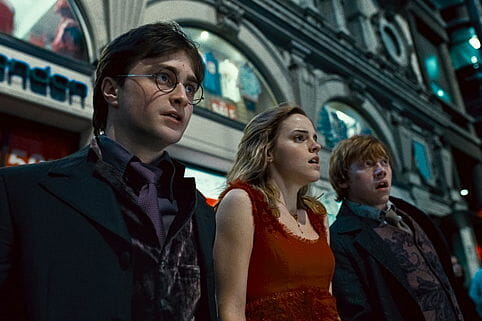By Jim Rohner · November 22, 2010

For years the Harry Potter film franchise differentiated itself from others with its revolving door of directors, each of whom brought their own interpretation to the ever-evolving and maturing story of The Boy Who Lived. After Harry Potter and the Half-Blood Prince, Warner Bros. decided they wanted David Yates to helm the series to its conclusion. This decision ruffled some fans' feathers, especially those who criticized Half-Blood Prince as being 153 minutes of setup. But with Harry Potter and the Deathly Hallows: Part 1, Yates proves that, like Albus Dumbledore, he had a plan all along and it's beginning to come to fantastic fruition.
For those who may be going into Deathly Hallows: Part 1 having not read the books, I would say the best way to prepare yourself for this film is to expect the exact opposite of everything you've seen before. This, you may already know, is the first film that takes place entirely outside the walls of Hogwarts School of Witchcraft and Wizardry and therefore we, like Harry, are exploring an entirely unfamiliar world. Aside from Half-Blood Prince, Deathly Hallows features the least amount of action in relation to runtime and yet it is the most tense the franchise has ever been because it is a film of almosts: Harry almost abandons his friends at the beginning of the film; he and Hermione almost share a kiss; the three of them are almost caught by Death Eaters many times; one of them almost gives up for good. Even the sky seems to mimic the edge of a knife nature of the quest as at any moment the clouds could break and the sun could shine or they could open up and unleash a torrential downpour. Any moment could spell doom for Harry, Ron and Hermione, but any moment could also reveal the way for them as well.
Because of this, many gigantic action set pieces are teased and hinted at instead instead unfolded before us. Many significant events, such as the death of important characters, happen entirely off screen. Battles break out around the three protagonists, but they do whatever they can to escape. Their purpose is seek while they are being sought – fighting would attract unwanted and potentially life-threatening attention. This results in a lot of scenes in which our characters are talking about things that have happened for two and a half hours rather than acting on them. Normally this is a cardinal sin for blockbusters, but it works exceptionally well for three reasons.
Firstly, Half-Blood Prince was indeed 153 minutes of setup, but the emotional connections and intimate relationships that were constructed in that film helped set the stage for the high stakes and potential consequences put forth here. For instance, very little is seen of Ginny in Deathly Hallows, but the fact that we know Harry's heart is with her makes the fact that he has to abandon her upon an attack at the Burrow even more heartbreaking. At the beginning of the film, Hermione must fight back tears as she casts a spell to erase her parents' memories, removing herself from all pictures in the house before she departs without a word for what might be a trip from which she will never return. As she walks down the street we realize the gravity of the sacrifice she has chosen to make and the tone has been set for events to come.
Secondly, David Yates is a director who excels at crafting mood. Since he took over for Order of the Phoenix, dialogue has been cut down and cinematography has become darker. Yates knows that actions speak louder than words and that silence, when used properly, can speak louder than actions. Many scenes end with cross fades, which may seem like a trivial and even lazy editing technique, but in the hands of Mark Day, it becomes another reminder that Harry, Ron and Hermione are truly alone in their quest. Similarly, the cinematography of Eduardo Serra opens up the world they inhabit while making it seem simultaneously empty. For six films it has been pounded into the heads of all who'll listen what's at stake and what must inevitably be done. Now that it comes time to do it, every element of this film is subtly asking, "what now?"
Thirdly, not enough can be said about the three leads. As the films have progressed there's been plenty written about the maturity and development of Daniel Radcliffe, Rupert Grint and Emma Watson, but this is the first time they're almost exclusively called upon to carry a film and they deliver admirably. On a journey filled with cabin fever and further exploration into darkness, tempers are tested, relationships are re-examined and these three young actors shine brighter than they ever have before. The fact that Radcliffe, whom I've always maintained was the most skilled of the bunch, is overshadowed by Grint and Watson especially speaks volumes to how the three have developed as dramatic actors. Without their strong performances, Deathly Hallows falls apart.
If there's one flaw in Deathly Hallows, it's that having been based on such dense source material, the film maintains somewhat of an insider feel, with certain references and sequences only fully making sense to those who have read the book. Still, after six films, half of which are truly exceptional, such a critique is nitpicking. If you're been on board for everything up through Half-Blood Prince, you're not going to encounter anything that will fully alienate you anyway.
Personally, Deathly Hallows is a bittersweet film for me – it's another great installment, but also a signal of the beginning of the end. However, if it has to go, at least we can be assured that with Yates at the helm, it'll go out with a bang.